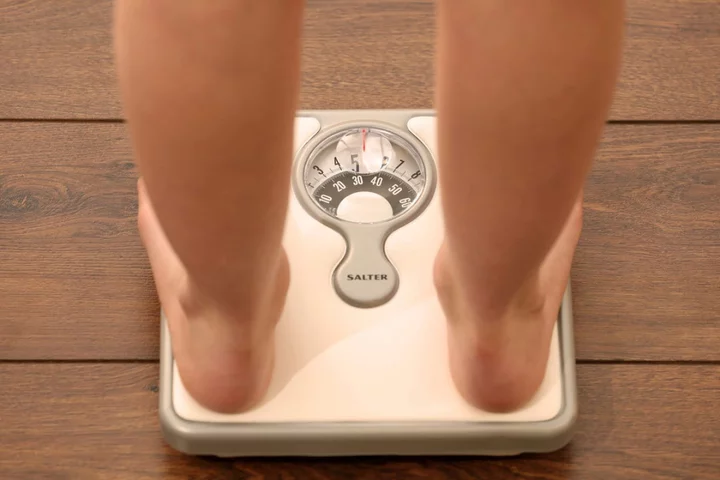
Claire Richards: I could risk losing my career going on Eurovision
Steps singer Claire Richards says she'd consider going on The Eurovision Song Contest if she wanted to sabotage her career.
2023-06-28 21:17

Kosovo media guide
An overview of the media in Kosovo, including links to broadcasters and newspapers.
2023-06-28 21:16

Polaris guitarist Ryan Siew dead at 26
Australian metalcore band Polaris have confirmed the death of guitarist Ryan Siew at the age of 26.
2023-06-28 20:54

Linguistic Siblings: 9 Pairs of Words With Surprisingly Shared Etymologies
The connections between words aren’t always as straightforward as the link between run and runner; often, figuring them out requires the subtle unraveling of linguistic evolution, the kind of detective work that makes etymology so fascinating.
2023-06-28 20:21

AMRA Medical´s Latest Research Finds a Strong Association Between Personalized Body Fat Z-Scores Describing Skewed Fat Distribution and Specific Cardiometabolic Risk Profiles
LINKÖPING, Sweden--(BUSINESS WIRE)--Jun 28, 2023--
2023-06-28 19:53

Elon Musk ‘microdoses ketamine to manage depression’, report says
Elon Musk reportedly takes “microdoses” of “ketamine”, a drug he has praised as being “a better option” than antidepressants when “taken occasionally”. The SpaceX founder is said to use the dissociative anaesthetic to manage depression. Musk, 52, previously tweeted in 2017 about his struggles with mental health. Speculating that he could have bipolar disorder, he spoke of how he experienced “great highs, terrible lows and unrelenting stress”. According to The Wall Street Journal(WSJ), people close to Musk have witnessed him using ketamine in small doses. Following the publication of WSJ’s article on Tuesday (27 June), Musk tweeted that while depression is “overdiagnosed” in the US, it is a “brain chemistry issue” for some people. He believed that “zombifying people” with selective serotonin uptake inhibitors (SSRIs), a widely used type of antidepressant medication, “happens way too much”. “From what I’ve seen with friends, ketamine taken occasionally is a better option,” Musk added. The Independent has contacted Musk for comment. His attorney and top advisor did not respond to WSJ’s request for comment, it was reported. In 2017, Musk answered questions from Twitter users about his personal life and was asked about his mental health. He wrote: “The reality is great highs, terrible lows and unrelenting stress. Don’t think people want to hear about the last two.” When asked if he had bipolar disorder, the South African entrepreneur simply replied: “Yeah.” According to the NHS, bipolar disorder is characterised by extreme mood swings that can range from extreme highs (known as ‘mania’) to extreme lows (depression). It can be treated in several ways, including taking medication to treat prevent and stabilise episodes of mania and depression. In a later tweet, Musk added that he may not be “medically” bipolar, but said he does not know. “Bad feelings correlate to bad events, so maybe [the] real problem is getting carried away in what I sign up for,” he wrote. Microdosing involves consuming small doses of drugs, usually psychedelic or sub-hallucinogenic substances such lysergic acid diethylamide (LSD) or mushrooms with psilocybins. Ketamine is an approved drug in the US for treating severe depression that has not improved with other therapies. In the UK, it is approved as an anaesthetic drug by the Medicines and Healthcare Products Regulatory Agency (MHRA), but not for use in treating depression. However, in 2019, a drug similar to ketamine – known as esketamine, which is taken as a nasal spray – was approved in the UK for treating severe depression. Read More Walk this way... but not like that: How men’s walks became sexualised Sarah Ferguson reveals she almost skipped doctor’s appointment that led to cancer diagnosis Influencers face backlash for promoting Shein factory during PR trip in China Elon Musk vs Mark Zuckerberg: Who would win a fight between tech titans? Elon Musk’s sister says she’s been overcharged due to her last name Nicolas Cage once bought a plane seat for his son’s imaginary friend
2023-06-28 19:24

P&G Grooming Invites Dermatologist Community to Go ‘Skin Deep Into Grooming’ at the 25th World Congress of Dermatology
BOSTON--(BUSINESS WIRE)--Jun 28, 2023--
2023-06-28 18:23

New mum has all teeth removed after rare condition made them fall out during pregnancy
A mum who had her teeth removed after she vomited so much while she was pregnant - has gone on to have more children and embrace life. Louise Cooper, 26, became pregnant for the first time while she was working as a nanny at a ski resort in France. A week after finding out, the mum-of-three said she got so sick she had to move back to the UK. Louise was diagnosed with Hyperemesis Gravidarum (HG) in April 2017 – a condition which affects around 1% of women. Louise would vomit so frequently, her teeth started falling out. Her first child, Zachary, five, was born in November 2017 and six months later Louise had to have all her teeth removed as they were so damaged. Since then, Louise has had two more children, has embraced life without teeth and often goes out without wearing her dentures. Louise, a hairdresser, from Reading, Berkshire, said: “Life is alright now, everything has gone back to normal. “Life is a lot more relaxing and enjoyable. It is not enjoyable when you have HG and are in bed for nine months. “I have embraced having no teeth. I have only really just come to terms with everything in the past year. “It has restricted my diet - I don’t eat a lot of meat anymore. “I mainly stick to eating vegetables.” Louise fell pregnant with her first child in February 2017. A week after she found out she was pregnant, Louise’s sickness was so bad she returned home to be with her family. Three months after falling pregnant, Louise wasn’t getting any better and was bed bound for much of her pregnancy. In April 2017, Louise was diagnosed with Hyperemesis Gravidarum (HG) - excessive nausea and vomiting. Louise said: “The damage was caused by the acid from vomiting. “I lost my first tooth around 16 weeks and it was just out of nowhere. “I was told that my teeth would need to be removed as they were so damaged. “I gave birth to my son in November 2017 and six months after that I had my teeth removed.” After the birth of her son, Louise has had two more children - Ollie, three, and Oakley, 11 months - and every time she has suffered from HG. She said: “HG disappears when the baby is delivered. “However I had more than one child and I have suffered from HG every time. “I would say my diet isn’t the healthiest as it is restricted from trauma. “I have a lot of trauma about food groups, it is so traumatic to go through severe vomiting for nine months - it was none stop. “It is hard to go back into a routine of understanding that food won’t make me vomit anymore. “It was very traumatic, I wouldn’t wish it upon my worst enemy. “A lot of people compare it to the side effects of chemo as you feel like you are dying. “It is unpleasant. It is emotionally and physically draining.” Within the last year, Louise said she has only just managed to come to terms with having no teeth and will now leave the house without her dentures. She said: “I have accepted the fact I have no teeth. “I have dentures now but they are not the most comfortable things to wear as they are cosmetic. “They are also very triggering for the traumatic side of HG. “I can now leave the house without having teeth in. Life is more relaxing and enjoyable for me.” Read More Why are Russian and Belarusian players allowed back at Wimbledon? Matt Hancock seeks to humiliate himself in public again Intermittent fasting ‘no better for weight loss’ than calorie counting British toddler has American accent after watching popular YouTube show GB News in ‘significant breach’ of Ofcom rules over Covid vaccine claims
2023-06-28 17:18

Reading for pleasure in childhood boosts brain health in teenage years – study
Reading for pleasure in early childhood can help youngsters perform better at school and boost their mental health as they enter teenage years, a study suggests. The study of more than 10,000 children found that those who started reading for fun at a young age performed better at cognitive tests and showed improved “brain structure” in adolescence. For “optimal” results, children should be reading for 12 hours every week, academics from the universities of Cambridge and Warwick in the UK, and Fudan University in China, found. Their study, published in the journal Psychological Medicine, analysed data on the children, all from the US, including interviews, cognitive tests, mental and behavioural assessments and brain scans. We encourage parents to do their best to awaken the joy of reading in their children at an early age Professor Jianfeng Feng They then compared information on children who began reading for pleasure before they turned nine against those who started later, or not at all. Of the 10,243 participants studied, just under a half (48%) had little experience of reading for pleasure or did not begin doing so until later in their childhood. The other half had between three and 10 years’ reading for pleasure. Those who started reading for pleasure at a young age were found to perform better on cognitive tests, which measured verbal learning, memory and speech development, and school academic achievement, when they were teenagers. These children also had better mental wellbeing, showing fewer signs of stress and depression, as well as improved attention and fewer behavioural problems such as aggression and rule-breaking. They also tended to use screens less and slept longer. Academics also analysed brain scans of teenagers and found that those who started reading for pleasure at a young age showed moderately larger total brain areas and volumes, and also showed differences in brain regions previously shown to relate to improved mental health, behaviour and attention. “Reading isn’t just a pleasurable experience – it’s widely accepted that it inspires thinking and creativity, increases empathy and reduces stress,” said Professor Barbara Sahakian from the Department of Psychiatry at the University of Cambridge. “But on top of this, we found significant evidence that it’s linked to important developmental factors in children, improving their cognition, mental health, and brain structure, which are cornerstones for future learning and well-being.” Professor Jianfeng Feng from Fudan University in Shanghai, China, and the University of Warwick, added: “We encourage parents to do their best to awaken the joy of reading in their children at an early age. “Done right, this will not only give them pleasure and enjoyment, but will also help their development and encourage long-term reading habits, which may also prove beneficial into adult life.” Read More Charity boss speaks out over ‘traumatic’ encounter with royal aide Ukraine war’s heaviest fight rages in east - follow live Stan Wawrinka on setbacks, preparing for Wimbledon and friendship with Roger Federer Hacks for saving money on school uniforms King Charles and Queen Camilla surprise spa guests in bathrobes at eco-village
2023-06-28 16:53

Stan Wawrinka on setbacks, preparing for Wimbledon and friendship with Roger Federer
With Wimbledon starting next week, Stan Wawrinka is excited about returning to London’s iconic championships. “It’s really a different tournament with the history, also the fact that we play on grass courts. The courts are amazing, the atmosphere is great,” he says on a video call from the All England Lawn Tennis and Croquet Club. Today, the Swiss player is taking a break from his gruelling training schedule to visit SW19 as part of his long-running partnership with Evian. “It’s always special for us players to go practise or to play matches on small courts as well, because you have so many fans coming and the atmosphere is always going to be special,” he continues, saying his most memorable Wimbledon match was against a certain Swiss opponent. “I played one quarter final against Roger [Federer] on Centre Court – it’s always special to play Roger, to play him here was something really nice.” Ahead of the famous championships, the 38-year-old has been training in Monaco, before heading back to London this week. So, how does the three-time Grand Slam winner balance the physical and psychological aspects of preparing for high-profile events? “It’s all a big puzzle,” says Wawrinka, who was born near Lausanne to a German father and Swiss mother. “As a tennis player, you have the fitness side and you have the mental part – you have everything that you need to do to be ready.” Plus, there’s the challenge of having to deal with defeats: “Tennis is a tough sport in the way that you end up almost every week losing. You need to accept [that you will] lose and try to learn and take something positive from it.” How does the former world number three cope with not winning? “I try to refocus on myself, try to also think about everything I’ve been doing in practice… you can lose against a better player. If you know you’re doing the right things, then you can only be positive about it.” Stan the Man (as he’s known to fans) isn’t fazed by comparisons to Federer – whom he’s beaten on just three of the 26 times they’ve competed on court. “I always look for the positive of the situation and I’ve been lucky enough that when I arrived [on the circuit] I was a little bit younger than him – he was already at the top,” says Wawrinka, who is three years younger than his record-breaking countryman. “For me, it was a chance to have Roger in the same country… I had the chance to practise with him and he became a friend.” The pair were victorious at the Davis Cup in 2014 and at the Beijing Olympics in 2008, taking gold in the men’s doubles. “The Olympics are something that any athlete in any sport dreams about, to play individually, but [playing] doubles and to feel like a team it was super special,” Wawrinka recalls. How does training for doubles matches compare to singles? “It’s more the mental part. You need to know your partner, talk with him a lot about the tactics, but more about what’s going to happen. “Communication is really important on the court, but also off the court. For us, it was quite easy to play together because we are such close friends.” Seen as a late bloomer in terms of tennis, Wawrinka admits it was a struggle waiting to achieve his inaugural Grand Slam title at the Australian Open in 2014. “For me, the most challenging part was to find the confidence in myself and in my game. I only won my first Grand Slam at 29 years old, it took me a while to really find that confidence.” Suffering setbacks throughout his career due to knee, elbow and foot injuries, Wawrinka’s ranking has yo-yoed in the past few years, but he returned to the world top 100 in February. “It was tough to be back at 37 years old after more than a year out for another two surgeries,” he says. “It was not easy, but for me, it’s about the passion. I love what I’m doing, I enjoy the process… it was, of course, so special to be back again in the top 100.” Off the court, he unwinds by spending time with daughter Alexia, 13, whom he shares with ex-wife Ilham Vuilloud, a Swiss TV presenter: “I’m traveling a lot so I don’t have that much time to be with her, so I’m trying to enjoy that.” Having grown up on his parents’ biodynamic farm, the tennis champ has inherited the green-fingered gene, growing fruit and veg in his garden back home in Switzerland. “I have tomatoes, courgettes, I have many fruits. I think it’s just different when you have your own garden than when you go buy it at the shop directly.” Reducing his impact on the environment is also a priority for the Evian global brand ambassador, which is why he’s pleased the water brand is introducing refillable bottles for players at Wimbledon for the first time this year. “It’s important for us, the players, [because] we’re traveling a lot – this new bottle is going to be great,” Wawrinka says. Two years away from 40 and with 16 career titles and 550 career wins under his belt, he’s not planning on hanging up his racket any time soon. “I’m still hoping to play a few more years on tour. It’s, of course, not easy, but I’m passionate about it. I want to enjoy it as much as I can,” Wawrinka says. “The time I will stop there will be no way back, so I need to really push and try to be as good as I can.” Evian, official water of the Championships, together with Wimbledon have launched a new refillable solution to hydrate players on court during this year’s tournament. Discover more at www.evian.com. Read More Charity boss speaks out over ‘traumatic’ encounter with royal aide Ukraine war’s heaviest fight rages in east - follow live Hacks for saving money on school uniforms King Charles and Queen Camilla surprise spa guests in bathrobes at eco-village Nearly 1.5m 18 and under referred for mental health support in 2022 – charity
2023-06-28 16:23

MG International Wins Second Award in Turkiye for its Environmentally Sensitive Projects
ISTANBUL--(BUSINESS WIRE)--Jun 28, 2023--
2023-06-28 15:47

Intermittent fasting ‘no better for weight loss’ than calorie counting
Time-restricted eating, commonly known as intermittent fasting, may produce similar weight loss results for adults with obesity compared to traditional calorie counting, according to a new study. The small clinical trial, whose results were published on Tuesday in the journal Annals of Internal Medicine, found that participants who engaged in 8-hour time restricted eating had improved insulin sensitivity compared to those in the control group who ate their calories any time over 10 or more hours a day. Over a billion people worldwide are obese with the with the disease projected to grow in prevalence across the globe, according to the World Health Organization. Obesity has also been found to be a serious risk factor for other metabolic diseases such as type 2 diabetes, heart disease, and some types of cancer. A widely adopted tried-and-tested method to lose weight is to burn more calories than one consumes, and to achieve this, individuals typically count the calories of the food they eat each day. While this traditional approach for losing weight involves counting calories, time-restricted eating, without calorie counting, has also emerged as a popular strategy as it is easier to follow. However, whether intermittent fasting is as effective in producing weight loss, especially beyond the short term, has remained unclear. In the new research, scientists from the University of Illinois Chicago studied 90 adults with obesity from the Greater Chicago area to determine whether intermittent fasting or calorie restricted eating would be more effective for weight control and heart disease risk reduction. Researchers randomly assigned participants to 1 of 3 groups: 8-hour time-restricted eating from noon to 8:00 pm only without calorie counting; reducing a fourth of their calories daily; or no change in calorie consumption with eating taking place over 10 hours or more throughout the day. Participants who followed time-restricted eating and those adopting calorie restriction met regularly with a dietician. The study found that participants who engaged in time-restricted eating ate 425 fewer calories per day than the control group and lost about 4.5kg (10lb) more than the control group after one year. On the other hand, the calorie-restricted group ate 405 fewer calories per day and lost about 5.5kg (12lb) more after one year, with participants in both groups showing high adherence to their interventions. Scientists believe the new study and its findings can help make better-informed clinical decisions by taking individual preferences into consideration, rather than just choosing a diet that may be more effective. Researchers also point out that access to dieticians likely helped the participants make healthier food choices. As there was substantial individual variability in weight loss among participants using these interventions, they called for further research to determine who would most benefit from each of these diet choices. Read More Scientist behind Ozempic says drug can make life ‘so miserably boring’ Teens with severe obesity are turning to surgery and new weight loss drugs, despite controversy Two children were born with ‘insatiable hunger’ that left them severely obese. Now scientists know why British toddler has American accent after watching popular YouTube show GB News in ‘significant breach’ of Ofcom rules over Covid vaccine claims NHS unions vote to accept government pay deal – but nurses could still strike
2023-06-28 15:46
